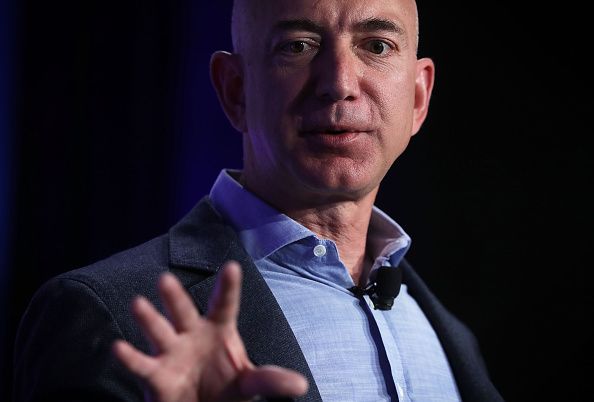
Jeff Bezos became one of the richest people in the world thanks to an online book retailer he founded and ran, at first, out of his garage in Seattle. As the endeavor grew into the all-mighty shopping site Amazon.com, so did Bezos's wealth. A spike in Amazon's stock last month after the company purchased Whole Foods pushed him within $5 billion of the top spot on the wealth list, now held by Bill Gates.
"I have won this lottery," Bezos said at a gala held on Saturday at the Kennedy Space Center in Cape Canaveral in Florida. "It's a gigantic lottery, and it's called Amazon.com. And I'm using my lottery winnings to push us a little further into space," he added. "I feel incredibly lucky to be able to do that," having had a passion for space exploration since childhood.
The gala, which celebrated 48 years since the Apollo 11 moon landing on July 20, 1969, was a fundraiser for Buzz Aldrin's ShareSpace Foundation. Aldrin, who was the second man and one of only a dozen ever to walk on the moon, presented Bezos with the first Buzz Aldrin Space Innovation Award.
"Jeff Bezos told me on a recent visit to Blue Origin that he's been dreaming of space since the age of 5 years old," Aldrin said. "He watched Neil [Armstrong], Mike [Collins] and me journey to the moon during Apollo 11 in 1969. Since then, he has charted his course through innovation, and he's been quietly breaking barriers with Blue Origin."
Bezos founded Blue Origin in 2000, two years before Elon Musk's SpaceX, in Kent, Washington. For many years the company kept its plans quiet—"Blue Origin keeps a very low, even secretive profile about its activities," the NewSpace Journal wrote in 2013—emerging into the public eye only in recent years. The private company focuses on developing technologies to enable commercial human space transportation and "has a long-term vision of greatly increasing the number of people that fly into space so that we humans can better continue exploring the solar system."
At the 33rd annual Space Symposium in Colorado Springs, Colorado, this April, Bezos revealed that he was selling about $1 billion in Amazon stock per year to finance Blue Origin and its mission. (Quartz flagged that if that was indeed his business model for the rocket company, it was a new one.)
"Space travel is just too darn expensive. And we know why it's too expensive. It's because we throw the rockets away," Bezos said. "We're never going on to do these grand things and to expand into the solar system as long as we throw this hardware away. We need to build reusable rockets, and that is what Blue Origin is dedicated to," he added. "It's a passion, but it's also important."
Blue Origin first succeeded in landing a rocket in November 2015, when it launched its reusable New Shepard space vehicle, let it soar to 329,839 feet and saw it make a controlled landing just four and a half feet from the center of the pad. Since then, Bezos has announced plans for its first orbital rocket, the New Glenn, and revealed plans to take paying passengers to space by 2018.
While those would be brief suborbital trips to allow space tourists to experience weightlessness, Bezos has other ideas for the long run. "We should build a permanent settlement on one of the poles of the moon," Bezos said at the gala. "If we have reusable rockets, we can do it so much more affordably than we have ever done it before. We have the tools. We have the young people with a passion to do it. We can get that done today."
In other words, he said in the company of one of the first humans to land on the moon, "it's time for America to go back to the moon, this time to stay."
Uncommon Knowledge
Newsweek is committed to challenging conventional wisdom and finding connections in the search for common ground.
Newsweek is committed to challenging conventional wisdom and finding connections in the search for common ground.
About the writer
Stav is a general assignment staff writer for Newsweek. She received the Newswomen's Club of New York's 2016 Martha Coman Front ... Read more
To read how Newsweek uses AI as a newsroom tool, Click here.








